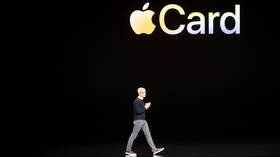‘DISLIKE’: Russia’s Facebook rival VK to roll out this ONE button FB users always wanted but never got
Russian social network VKontakte has unveiled the upcoming ‘dislike’ button, a simple feature that has been cruelly denied to Facebook users despite years of begging. Now Mark Zuckerberg can claim it was a Russian plot all along!
The feature was announced on Wednesday at VK’s Content Day conference in Moscow, and the company thinks it will help “invigorate” the comment section.
VK has answered its users’ prayers with the button, which will appear as an option next to the ‘like’ button on comments, giving users the ability to register disapproval or disagreement without actually leaving a comment of their own. Enough dislikes will turn a comment invisible.
Also on rt.com Facebook re-brands in all caps, failing to defuse internet ire over monopoly status, fake news, and privacy predation"Dislike" is far from a feature wanted only by VK denizens. Facebook users have pleaded with CEO Mark Zuckerberg for such a button of their own since the “like” button was first unveiled in 2009, only to be denied clickable catharsis. While the platform rolled out emoji reactions in 2016, giving users the option to respond to comments and posts they didn’t like with a ‘sad face’ or ‘angry face,’ there was to be no inversion of Facebook’s iconic blue thumbs-up gesture.
Zuckerberg himself said he is concerned such a button would be used to “demean” others’ posts, apparently unaware of the kind of comments people leave when they don’t have access to such a button.
The dislike button was so popular among Facebook users that multiple petitions were created to try to change Zuckerberg’s mind. Scammers even lured victims to a malware site by dangling the opportunity to add a “dislike” button to their Facebook before everyone else.
Being beaten to the “dislike” punch by VK is not the only recent frustration for Facebook. The world’s largest social network (and its subsidiary Instagram) recently banned the eggplant, peach, and water droplet emojis when used in a “sexual context” in an effort to put a damper on content that “facilitates, encourages, or coordinates sexual encounters between adults.”
For a platform that unveiled “Facebook Dating” just a few months ago, the social media behemoth doesn’t seem to understand that discouraging sexual encounters won’t win it any customers.
Facebook: We have no way to ban hate speech and fake news.Also Facebook: Our algorithm can detect the user intent of a fruit emoji with 100% accuracy. https://t.co/uVktjJ5geM
— Spencer Callaghan (@Senturion) October 31, 2019
Leaving aside who will be tasked with judging the context of a fruit- and veggie-laden message, Facebook’s move inspired ridicule from users who mused the platform might be trying to virtue-signal to distract from anger over its political ad policy after Twitter appeased critics by banning all political ads.
Ranked No. 12 most popular website in the world, VK is the social network of choice in Russia, with over 38 million monthly users, out of the total 100 million logging in from Russian IP addresses.
While its 477 million accounts worldwide are dwarfed by Facebook’s army of over 2 billion registered users, VK’s numbers are growing. On its blog, VK announced the number of authors and published stories was increasing by 50 percent year over year, while the number of comments had increased 49 percent over 2018. The platform has also rolled out a Patreon competitor, called VK Donut.
Also on rt.com Facebook, YouTube will scrub ‘any and all mentions’ of alleged ‘Ukrainegate’ whistleblower from posts & adsMeanwhile, Facebook has been running out of steam. It actually lost daily users among all age groups in the US last year, and the decline has been especially pronounced among young users.
The platform has tried to shore up its scandal-plagued reputation by slapping its branding on Instagram and WhatsApp, but with antitrust and privacy investigations looming at the state and federal level – as well as dozens of lawsuits stemming from the Cambridge Analytica affair and numerous accusations of politically-motivated censorship – public opinion seems to be turning against it.
Think your friends would be interested? Share this story!














